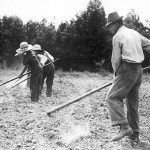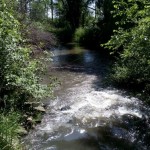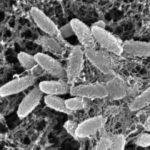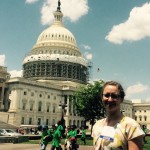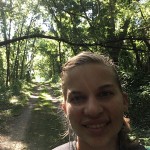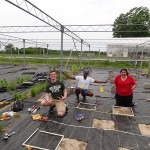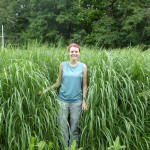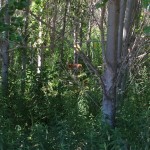By Braeden Van Deynze, a PhD student working with Dr. Scott Swinton in the Department of Ag Food & Resource Economics at Michigan State University. Dr. Swinton is also one of the lead scientists with the Kellogg Biological Station Long-term Ecological Research (KBS LTER) program. Here Braeden explains their work taking a long-term view of weed management in the United States, in press in the European Journal of Development Research. ~~~~~~~ Since the dawn of agriculture, farmers have done battle with weeds. These unwanted pests grow in competition with crops, siphoning off nutrients,
Hoes to Herbicides: Reflecting on the last century of weed control and preparing for the next
From Michigan to Mexico: International collaborations to aid agriculture, climate
This piece was originally published in Michigan Farmer on Feb. 8, 2017 at http://www.michiganfarmer.com/crops/michigan-mexico-international-collaborations-aid-agriculture-climate ~~~~~ Through the help of multiple partners, a small project that started in the early 2000s at the Kellogg Biological Station Long-term Ecological Research near Hickory Corners has turned into an international effort to help Mexico reduce its greenhouse gas emissions. In the early 2000s, LTER’s Phil Robertson, a Michigan State University plant and soil professor, began researching how different rates of
How farmers use and manage nitrogen: Reflections from an LTER fellow
Each year the KBS LTER program awards two graduate students with summer research fellowships. Here Riva Denny describes the research her 2016 summer fellowship supported. Riva is a PhD student working with Dr. Sandra Marquart-Pyatt in the Department of Sociology, Michigan State University. ~~ As a sociology student who studies agriculture and the environment my research looks a little different from most of the research done at the Kellogg Biological Station Long-term Ecological Research (KBS LTER) site. I study the social aspects of nitrogen fertilizer use in US agriculture and the
Are we making selfish microbes?
This piece was authored by Terra Alpaugh and originally posted on the Long Term Ecological Research Network website. ~~~ Some bacteria become less cooperative with their plant hosts under long-term nutrient additions, finds new research by Jen Lau, an ecologist at the Kellogg Biological Station (KBS) LTER, and her collaborator Katy Heath at the University of Illinois. “A decade ago, no one was thinking about the idea of rapid evolution—the kind you could see over a career or even a year or two,” says Lau. Now researchers know that evolution can be measured at much smaller timescales
Had it with politics or ready to jump in: Reflections from an LTER researcher
By, Bonnie McGill, PhD candidate and LTER researcher, W.K Kellogg Biological Station, Michigan State University Tired of the US Presidential race dominating the airwaves? Wish the candidates talked about issues like climate change, global food security, or science education? Well, I can’t make any promises for any immediate changes (for that see sciencedebate.org), but one of my career goals is to use my scientific expertise to bring more science to Washington. As most any graduate student will tell you, exploring careers outside of academia while you’re immersed in academia is a
Michigan was pretty cool after all: Reflections from an undergraduate researcher
KBS undergraduate summer researcher Rebekah Sanchez is a horticulture major at the University of Puerto Rico. She wrote about her Research Experience for Undergraduates project working with mentor Kate Glanville, an LTER and GLBRC graduate student in Phil Robertson's lab. Rebekah was funded by an REU site award to the Kellogg Biological Station and by an ESA SEEDS Fellowship. ~~~~~~~~~~~~ One of the cool things about going to new places or engaging in different experiences is that they rarely turn out how you imagined. Sometimes an experience exceeds your expectations and other times you
My summer at Kellogg Biological Station: Reflections from an undergraduate researcher
KBS undergraduate summer researcher Bibiana Rodriguez is a Biology major at California State Univ. - Sacramento. She wrote about her Research Experience for Undergraduates project working with Dr. Karen Stahlheber in Dr. Katherine Gross’ lab. Bibi was funded by an NSF REU site award to the Kellogg Biological Station. ~~~~~~~~~ This summer, I spent 11 weeks at the Kellogg Biological Station (KBS) as part of the Research Experience for Undergraduates (REU) program. Eleven weeks was all the time I had to: Work on my summer research project. Learn new techniques. Collect and analyze
Learning about the environment from the soil up: Reflections from an undergraduate researcher
KBS undergraduate summer researcher Kathryn Bloodworth is majoring in biology and environmental science at Eastern University, near Philadelphia. She wrote about her Research Experience for Undergraduates experience working with Will West, a post-doc in Sarah Evan's lab. Kathryn was funded by an ESA SEEDS fellowship and an NSF REU site award to the Kellogg Biological Station. ~~~~~~~~~~~~~~~ My name is Kathryn Bloodworth and I am a rising senior at Eastern University, located outside of Philadelphia. There I study biology and environmental science and for the last eleven weeks I have had
10cc’s of experience. Stat!: Reflections from an undergraduate researcher
KBS undergraduate summer researcher Parker Anderson is a pre-medical student at Michigan State University. He wrote about his Undergraduate Research Apprenticeship (URA) experience working with Kate Glanville, an LTER & GLBRC graduate student in Phil Robertson’s lab. Parker was funded by the Great Lakes Bioenergy Research Center. ~~~~~~~~~~~~~~~ As a pre-medical student at Michigan State University, I was nothing less than bewildered and intimidated as my research mentor, Kate Glanville, drove my colleague and myself through the Long-term Ecological Research (LTER) site. The sights,
The forest, animals, and my missing bottles: Reflections from an undergraduate researcher
KBS undergraduate summer researcher Aleah Dungee is majoring in Biology at Norfolk State University. She wrote about her Research Experience for Undergraduates experience working with Di Liang, an LTER graduate student in Phil Robertson’s lab. Aleah was funded by an NSF REU site award to the Kellogg Biological Station. ~~~~ This summer as a participant in the Research Experience for Undergraduates program at the Kellogg Biological Station, I researched the relative contributions of ammonia oxidizing archaea (AOA) and ammonia oxidizing bacteria (AOB) to nitrification on different land use
- « Previous Page
- 1
- …
- 8
- 9
- 10
- 11
- 12
- …
- 17
- Next Page »
